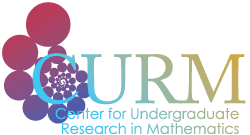CURM offers two workshops each year to support faculty development.
The first workshop, open to anyone who wishes to attend and not a requirement of the minigrant, is the Proposal Development Workshop. At this workshop, interested faculty can learn about CURM, the rewards and challenges of mentoring first and second year college students in research, and qualities of a strong proposal to the CURM minigrant program.
The second workshop, restricted to CURM minigrant participants and a requirement of the minigrant award, is the Summer Faculty Workshop. This three-day, in-person workshop includes a full-day research immersion, a panel of diverse undergraduate research students sharing successes and difficult scenarios encountered, and a program of specific presentations and discussions led by CURM directors and alumni with topics such as developing a research course, recruiting students, creating a manageable timeline for academic-year undergraduate research, how to get started mentoring undergraduate students in research, potential pitfalls and overcoming them during the mentoring journey, working with group dynamics among students with different backgrounds and skills, and helping students develop independence in doing research. These topics are chosen so that faculty mentors feel prepared to support all their students, especially those from groups minoritized in math. A key piece of the workshop is the community and expertise that is developed and shared among the faculty participants. During this workshop, there will also be some social activities. Participants’ costs to attend the workshop will be covered by CURM (travel and shared lodging and meals).
The research immersion portion of the summer workshop is designed to, on one hand, provide faculty who may not be research-active with the tools and resources they need to develop an effective research project area for undergraduates, and, on the other, provide research-active faculty with the context and perspective they need to develop research projects that are achievable by early stage students. In both cases, we aim to build a collaborative and mutually supportive research community among participants. Mathematically, the research immersion will focus on the key four research areas of data science, discrete math, mathematical modeling, and math education.
